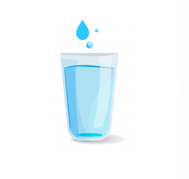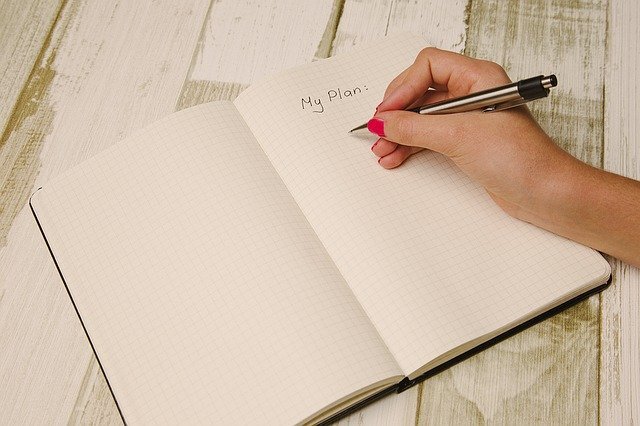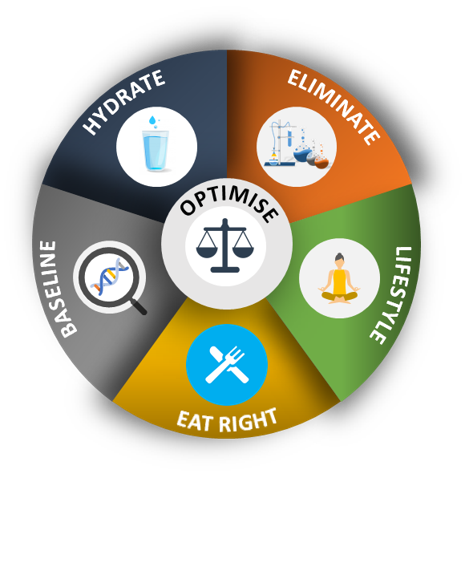STEP UP YOUR HEALTH
How to get healthy ?
What’s at the forefront at LivingIQ is being smart about the choices you make, large or small, they all make a difference to health living. This article stems from acquired knowledge gained after many years of research and applied practice, offering an approach to starting off your journey to better health, which in these times is ever so important.
IMPORTANT: Don’t try everything in this article at once, or you will likely set yourself up for failure. Start off slow, write down your goals as targets each with a time-frame and add/remove as you feel you can manage.
You don’t necessarily have to start at step 1, start anywhere as these steps are cyclic and never ending. The 6 steps describe a framework in which you introduce steps/changes in order to establish the right conditions for your health to flourish. A core principle is to address (identify) the underlying cause of illness rather than only suppressing symptoms. Equally, counter (prevent and improve) the ways in which you may be damaging your immune system by taking steps that you can introduce incrementally or rapidly depending on your level of health, your motivation and discipline.
smart stuff
Step 1. Establish Your Health Baseline
Healthy Living - How to Start
This will help you and your doctor identify the root cause of health issues that may need to be addressed. It is necessary to be your own detective and discover details about your level of health (rather than falling ill and leaving it for your doctor to tell you), to find out about an existing illness or potential future illness and risk spending time, effort and money on wasteful and ineffective changes. Basically, diagnose and treat accordingly.
Get as many as these tests done as routinely as possible:
Blood work (tests).
A lipid blood test to check your levels of HDL and LDL cholesterol. Catch the warning signs of almost any disease early. Many heart, lung, and kidney conditions can be diagnosed from a blood test. Your blood count can identify nutritional deficiencies, bone marrow issues, infections, heart issues and cancer. A metabolic blood test provides indication of kidney disease, diabetes, or hormone imbalances and liver function.
Urine Test
For indication of kidney and urinary tract disorders, including chronic kidney disease, diabetes, bladder infections and kidney stones.
Dental Checks
Your mouth, teeth and gums can affect your health significantly. Oral health can provide important insights into your overall health, and potentially identify an issue affecting the rest of your body. Regular checks with your dentist are absolutely essential. Schedule your checks and ensure you do not miss them.
Hair Mineral Analysis
Provides a record of the body’s nutrient, mineral levels and ratios (calcium, copper, zinc, selenium etc) and heavy metals (lead, mercury, aluminium etc), whilst also identifying mineral deficiencies and heavy metal toxicity.
Seek practitioner advice on how to balance your minerals and detoxify the metals as necessary.
DNA Testing
Helps to find the cause of your disease or symptoms
Gut Health Testing
Testing your gut microbiome will give you essential insights into your overall health. If you have an underlying leaky gut issue, this could very well be causing you chronic inflammation and thus the cause of a variety of health problems.
Latest Gear & Tech
Step 2. Hydrate
How to start getting healthy
The first essential and simple change to make is to hydrate your cells. Drink clean and well-balanced water. This is vital for you being alive, for your body to function properly and essential for your journey to better health. Ideally, the pH of your water should be somewhere between 6 and 8. Natural spring water is ideal, or at a minimum filtered tap water. If you can afford it, you may opt for a reverse osmosis water filtration system (to eliminate all the nasty bacteria, metals and chemicals) with a re-mineralization stage at the very end to restore the natural alkalinity and mineral balance of the water. However do as much research as you can to understand what the end product leaves behind.
On occasion drink Fiji or other branded water high is silica to help with the elimination of aluminium (Aluminium is neurotoxic resulting ultimately in neuronal cell death). Read (fiji water article)
Step 3. Establish a Healthy Diet
Next Step to getting healthy
At this step you should be adapting to the results from your health baseline (Step 1). However, if this is still pending, cut-down completely and significantly reduce the following:
Foods To Avoid
Eliminate highly refined sugars. Sugar adds fuel to disease processes and interferes with the immune system. Cut-down on processed sugar where possible. If you do need to use sugar, try a raw organic kind. Avoid aspartame, it is a harmful substance used as a sugar substitute added to foods. A variety of serious health problems and negative effects have been identified that negatively affect health. https://usrtk.org/sweeteners/aspartame_health_risks/
Most processed foods. Not all processed foods are really terrible to have. Those that contain naturally sourced, unrefined ingredients can fill the nutrition void, however, stick to products that have zero to as little processed ingredients as possible. Generally, avoid anything that contains artificial colours, preservatives and additives.
Soy results in hormonal disturbance, however if fermented and specifically Organic, is safer to consume in products such as Natto, Tempeh, Miso. The fermentation process breaks down enzyme inhibitors, neutralizes phytic acid from producing phytase and counters the disruption of thyroid hormones and endocrine function. Mostly though, 99% of the world’s soy is genetically modified. Phytoestrogens, stimulate the endocrine system to create more estrogens, potentially affecting offspring. Whilst may studies suggest benefits such as with breast cancer, there are also as many sources against. Side effects from WebMD: (https://www.webmd.com/vitamins/ai/ingredientmono-975/soy)
Iodised / Table Salt. Iodine is necessary for the production of thyroid hormones however iodine excess can contribute to thyroid disorders. If you are eating a healthy, balanced, varied diet (Grass-fed beef and pastured eggs for example contain some iodine), or some foods that have the highest amount of iodine are sea vegetables, then you are likely getting enough iodine and don’t need to use iodized salt. Get your levels tested by your doctor. Table salt in particular is highly processed, absent of most minerals, and usually contains anticaking agents such as aluminium. https://pubmed.ncbi.nlm.nih.gov/10667088/
Avoid harmful lectins (carbohydrate-binding proteins). Humans are unable to digest lectins, so they travel through your gut unchanged and can cause digestive distress. Examples of corn-derived products are corn syrup, cornstarch, cornflakes/various other breakfast cereals, corn chips, corn-oil. Other harmful lections can be found in legumes and beans. Quinoa also, unless fermented.
Non-Organic, chemical dairy. Conventional dairy is from livestock that is given antibiotics and fed unnatural and questionable chemicals to encourage faster growth. These can potentially disrupt your endocrine system. Estrogens and insulin-like growth factor found in dairy are thought to encourage initiation in breast, endometrial, and prostate cancers. Dairy food risk factors: https://www.ncbi.nlm.nih.gov/pmc/articles/PMC4524299/
Foods To Eat
change your diet change your life
Changing to a healthy diet should be about replacing processed food with unprocessed wholefoods whenever possible. A well-balanced diet of fat, protein, fiber, carbohydrates, vitamins and minerals aligned with a not too much or too little of anything approach (think moderation) will lead to sustaining a healthy functioning body. Check the article on Healthy Food Sources To Get Your Health On TrackYour Health On Track
Pasture-raised meats and chicken. Higher in Omega 3s and Better antioxidant levels (Nutritional Journal Review)
Ultimately you must have good gut health:
The elimination of inflammatory foods and incorporating prebiotics and probiotics can be vastly beneficial. For appropriate digestion and food absorption, a healthy gut is required.
Consider including some of the following foods in your diet for better gut health and digestion, however consider consulting a doctor if you have SIBO (Small Intestinal Bacteria Overgrowth), IBS (Irritable Bowel Syndrome), or FODMAP intolerances, adding extra bacteria to your diet may exacerbate your symptoms. The bacteria in a damaged gut must be nourished and rebalanced over time:
Bone Broth
Kombucha
Kefir
Sauerkraut and Kimchi
Ginger
Garlic
Chicory Root
Acacia
Dandelion
Jerusalem Artichoke
Onion
Asparagus
Leek
Jicama
Step 4. Optimise
How to optimise your health
All these steps are working towards optimising your health, however here is where you focus in on tweaking to get to your optimal levels of nutrition to establish the conditions for your immune system and bodily functions to really flourish. Strengthening your immune system will help you fend off illness from disease.
• Dental Cleanings. Have regular check-ups and cleanings. Some of the bacteria in your mouth can cause disease if allowed to build up and go untreated. Practice oral hygiene daily, at least twice daily, and visit your dentist at least every 6 months.
• Vitamin D & Magnesium. If they are low (get your levels tested), increase your levels of vitamin D and magnesium to the optimal ranges. If you don’t get out in the sun (approx. 15 mins per day / safely), particularly in the winter months or you have a skin condition, supplement as guided.
Suggested Product: Magnesium Threonate
• Vitamin C (study findings) protects the immune system and helps to fight off infections. No specific dosages are suggested other than being aware that high intake can result in gastrointestinal disturbances or diarrhoea, you may therefore you may want to use this as a guide.
• Omega 3. Fish oil, Krill oil, Sardines, Walnuts, to name a few. Improves cardiovascular health, “Could improve cardiovascular health and reduce the risk of cognitive decline with normal ageing” (study findings).
Suggested Product: Krill Oil
• Ensure moderate intake of selenium, zinc, chromium and manganese assist to remove mercury from the body. Selenium is the most important to remove mercury. Zinc in particular is responsible for activating white blood cells that are essential for the immune system. If your diet does not contain enough of these on a daily basis, supplement as guided.
• For Gut Health, consume pre and probiotics to maintain a healthy gut microbiome. Kefir, yogurts and fermented foods in general can help to promote the production of natural antibodies to assist the body’s immune response to viral infections.
• Herbal teas for anti-inflammatory and antioxidant-like benefits. such as burdock root and dandelion to boost liver health (article), or ginger (for inflammation, digestion, immunity, cardiovascular, Anticarcinogenic. (study findings), ginseng (Asian variety) to improve general well-being which although several studies (study findings) have concluded limited affects, it has been used in Chinese medicine for centuries and there’s ample anecdotal evidence to recommend an occasional intake
Step 5. Make Lifestyle Changes
how to change your lifestyle to be healthy
There is little debate that living a healthy lifestyle is good for you, particularly if the by-product is reducing your stress. This can be difficult to incorporate due to work and life constraints, and the willingness to get up and go. Here are some of the things you can do and whether you start just off doing one thing or several at once, the most important thing is to start at least on one:
Get out into nature
Getting amongst the fresh air, away from pollution and taking in visual stimulation goes a long way to de-stressing
Take long walks
Taking long walks will get the heard rate going at low impact. Benefits your hear, lungs and contributes to your well-being. You will probably have more success at maintaining this activity than running.
Set a routine
By setting yourself a daily schedule and reminders, you are more likely to keep up with your targets and once this becomes your normal routine, it becomes easier to accomplish your set goals.
Exercise, at least a little
Breathe
Practice deep breathing. Breathing stimulates the parasympathetic nervous system and acts as a natural detoxifier which helps to release toxins through your lungs, whilst also assisting immunity, improving energy levels and complementing your well-being (reference).
Thinking time
Set yourself a pause during the day (15-20 mins), a quiet time spent somewhere to sit and think about your problems and how to address them. Write them down. If these cause you anxiety and thus stress, thinking about how to resolve them helps with the build-up of anxiety. It may even help you sleep better.
Get more sleep
“a lack of sleep, or getting poor quality sleep, increases the risk of disorders including high blood pressure, cardiovascular disease, diabetes, depression, and obesity” (reference) Aim for 7-9 hours of sleep each night and maintain a consistent bedtime routine, sleeping and awaking at the same times.
Sleep Tips:
Lighting (avoid blue light). Sleep in darkness, or very dim lighting
Quite. No intermittent/loud noise, or introduce white noise to counter, i.e consistent sound of rain, forest etc.
Avoid alcohol and caffeine
Set a comfortable room temperature, i.e. 65 degrees fahrenheit / 18 degrees celsius (reference)
Exercise at least one hour before bedtime (reference)
Stretching to help the body to unwind and de-stress
Breathing at a slow, deep and rhythmic pace in and out through the nose triggers a relaxation response
Take a warm bath, add Epsom Salts or Essential Oils (below) for better effect
Intake of Magnesium rich food or supplement (as per your practitioner advice)
Add Essential oils to bath or diffuser (lavender, cedarwood, chamomile, sandalwood)
More tips on how to sleep better.
Step 6. Eliminate Toxic Sources
more way to get healthier
This step is not directly about detoxing as such, which is progressively done on a daily basis as you incorporate the earlier steps. The elimination of toxic sources is aimed at preventing toxicity from various sources. For example, if you prevent toxicity entering your body, you will be less toxic.
Stop Smoking
Quitting smoking will improve your heart rate (blood pressure will drop), circulation and lung function, and reduce your risk of coronary heart disease and stroke.
Limit Alcohol
Limiting your intake of alcohol normalises the Liver, lowers the risk of risk of cardiovascular disease, improves cognitive function and assists in weight loss. Stopping completely may be expected to be ideal, however red wine for example is suggested to contain antioxidants including beneficial resveratrol (good for inflammation, blood clotting and heart health). Whilst centenarians living in “Blue Zones” (longevity hotspots around the world) drink alcohol at least moderately (reference).
Check Your Cookware
We need to be concerned with the pots and pans we cook with due to the leaching of toxic chemicals into the food. Ensure your cookware is of high quality and are absent of any coatings that may leach heavy metals or other toxins. Where possible also avoid cooking with acidic foods for too long a time as this may increase the possibility of leaching.
Another general rule is to avoid cookware that you are unsure of, particularly In terms of Teflon, PTFE, PFOA , it is recommended to err on the side of caution and avoid these completely. PTFE for example has been shown to emit toxic gases
Absolutely avoid uncoated aluminium and no non-stick whatever the type.
Avoid Copper and limit the use of Iron. Your copper and iron intake should be from your food intake.
Glass is practical for baking but select a good quality product with no lead
Stainless Steel, is generally a safer choice as there are there are no chemicals,. It is usually made from a ratio of Chromium and Nickel, which varies from manufacturer to manufacturer. Some of these metals can leach into the food particularly when cooking for longer periods and with acid foods such as tomato.
Clay. Check for zero lead and cadmium in clay cookware. Read the documentation or write to the manufacturer and ask.
Ceramic. Take care. Lead can be found in ceramic cookware, Check your ceramic has no Lead and Cadmium. (Lead in Cookware reference)
The FDA maintains a list of products containing Lead and Cadmium:
Beauty & Personal Care Products
On a daily basis and frequently throughout the day, ingredients are being absorbed through the skin and into the bloodstream. Toxic substances can be damaging to your health, including those found in beauty products which are being applied topically such as shampoo, deodorants, makeup, fragrances, skin care etc. Avoid products that contain any of the following; petroleum based (such as mineral oils), Aluminium, parabens, sulfates, formaldehyde, paraffin, phthalates, oxybenzone, petrolatum, EDTA, DEA/TEA/MEA/ETA, PEGS, SLES, nanoparticles, heavy metals, BHA + BHT, triclosan, triclocarban, formaldehyde, ethylene glycol, plastic microbeads, carbon black, talc. Err on the side of caution. There are not really enough studies, not enough data and therefore not enough information to be certain of the effects, instead, use certified organic products or at least containing none of the toxins mentioned above.
Remove Mercury Fillings
Mercury is toxic to the nervous system and is overall an element you need to avoid and eliminate from your body. Have these type of fillings replaced, preferably by a biological dentist. By using chelators like chlorella or cilantro will assist with extraction, you can ‘push’ mercury into the urine and out of the body. Be aware that during chelation you may feel unwell for a period of time. Seek practitioner assistance when undertaking chelation.
Good Fish Choices
Avoid mercury where possible and eat wild caught fish (feed on natural organisms vs processed). Makeral, sardines for instance are low is mercury and high in Omega 3. Avoid eating too much shellfish as they are often high in cadmium, nickel, arsenic, aluminium and many toxic metals found in the coastal shelves where pollution may be prevalent. Be cautious of farmed fish, they can be higher in contaminants than wild caught, research the source and look into their quality control practices and ask about what is in the feed and water quality (farmed in pens in the ocean vs stagnant water / tanks).
The LivingIQ Better Health Framework
As you endeavour along these steps the idea is to treat this as a cyclic process, whereby you continue to optimise by re-baselining your health. To assess how you are progressing you should have your bloodwork, other checks and consultations done periodically to measure the changes and take note (keep a journal) also on how you feel each step of the way. Keep reading and researching new practices to complement and enhance your health.
Hopefully this article will have given you some good ideas on areas you may want to continue to research, and at the very least motivate you to start your journey to better health.
Thank you for reading.

















































